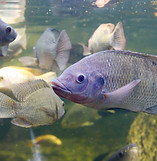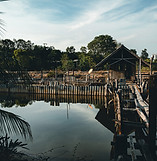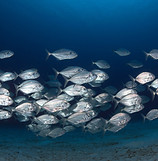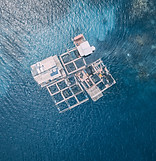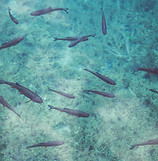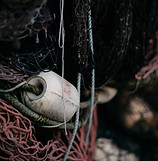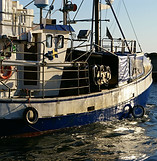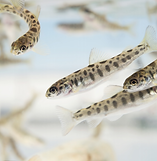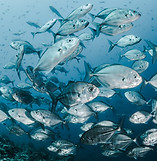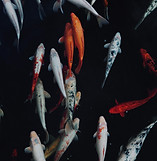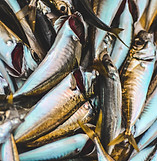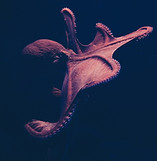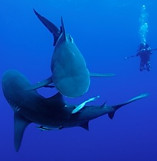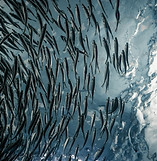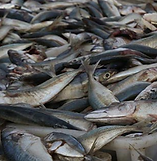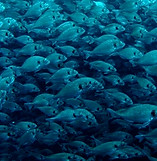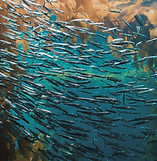
RESEARCH
AND
RESOURCES
Research & Resources
Below is an overview of our research, as well as selected reports and papers that we find particularly helpful. Also included are resources for those interested in learning more about fish welfare and advocacy.
We welcome questions and feedback. To ask about our research, please contact us.
Shorter pieces can be found on our blog.
OUR RESEARCH
Fish Welfare is a topic gaining global recognition. While fish are at the center of this, the value of improving fish welfare extends far beyond the fish themselves. This report can help equip all stakeholders in fish welfare with the relevant knowledge to best address fish welfare.
This 2023 report details Fish Welfare Initiative's study on dissolved oxygen (DO) levels across six fish farms in Andhra Pradesh, India. Key findings indicate a link between fish biomass and DO in 3/6 of the ponds, a complicated interaction between phytoplankton and DO, and fish gasping events aligning with low DO and elevated ammonia.
FWI worked with the International Cooperation Committee of Animal Welfare to investigate the welfare status of commonly farmed species in China and deepen understanding of current Chinese aquaculture practices and systems. This report details our fieldwork and findings from studying 12 freshwater fish farms in Guangdong, Shanghai, and Jiangsu provinces.
The Philippines has the seventh-largest aquaculture production in the world. A 3-month scoping study was initiated by Fish Welfare Initiative to collect data on the current culture systems in the Philippines and, from these findings, assess the welfare status of farmed fishes.
This report is a guest contribution and summarizes the current knowledge on the various methods used to farm finfish and some important ways these practices create both environmental harms and risks.
Fish production in Asia is growing fast, and this adds a wide range of welfare problems. Tapping into a dynamic industry, now is an important time to explore high-leverage opportunities for fish welfare work.
Different fish species have dramatically different welfare needs. This report proposes a prioritization process for identifying the species most promising to work with, and provides some tentative conclusions amongst species commonly farmed in Asia.
Salmon may be the most valuable fish in the world, but despite a steady improvement in standards, most farmed salmon still do not have "a life worth living." This guest report discusses why.
To properly understand what it means to bring positive welfare to fish, we must first understand what we refer to when we say “welfare.” This report considers the working definition of welfare that Fish Welfare Initiative uses in its operations.
To better understand the growing fish welfare advocacy movement, Fish Welfare Initiative ran a survey of 52 existing animal protection organizations selected due to their current work on fish issues or their intention to do so in the future.
In this report, we outline the various fish aquaculture systems used in Vietnam and assess the potential for work in Vietnam to promote higher fish welfare.
SELECTED EXTERNAL RESEARCH
Farmed Fish Overview Reports
This report covers considerations relevant to determining appropriate indicators of farmed fish welfare. It also discusses potential reforms to improve the welfare of farmed fishes.
Briefing that covers health problems and disease, handling, stocking density, breeding methods, genetic selection and genetic engineering and farming of new fish species.
This report reviews the scientific data that allows us to interpret the effects of disease, handling, transport, food deprivation, and slaughter technique on fish welfare.
Aquaculture practices and production—including handling, grading, transport, genetic manipulation, aggression from conspecifics, predation, physiological stress, and inhumane slaughter—compromise the welfare of fish.
This report provides an overview of the extent to which fish welfare might be impacted within the aquaculture industry, by describing the main processes of fish farming and their associated welfare implications.
Wild-Caught Fish Overview Reports
Policy briefings and recommendations for wild capture fisheries to reduce the suffering and stress of fishes. Examples from this briefing include recommendations to use available technologies to minimize handling, speed up the time from capture to slaughter, and reduce overcrowding in nets.
This report details slaughter practices in the UK and the steps that can be taken to ensure slaughter is as humane as possible.
Lessening the suffering of the fish in EU wild capture fisheries (Eurogroup for Animals, 2020) (version française)
Wild capture fisheries operate far out of sight and little attention is paid to the welfare of the animals harvested. This report suggests changes in order to reduce stress after capture, minimize handling, and avoid injury and asphyxiation.
Other Selected Research
Unnaturally high juvenile mortality and poor reporting in aquaculture hatcheries are among the main findings of Dyrevernalliansen and the Norwegian Veterinary Institute's project "Småfiskvel."
This paper aims to merge what is already known about positive welfare with the existing fish behavior literature to develop a plan of action for fish welfare research that will ultimately contribute to the development of positive welfare standards and assessment strategies for fish.
The effects of domestication on welfare of farmed fishes are complex to study because fish differ from livestock in genetics, physiology and behaviour, and experience different sensory worlds. The implementation of humane farming systems should integrate industry, science and ethics in an open dialogue in order to produce relevant results.
There is a growing body of scientific evidence demonstrating that fish are sentient animals – capable of effective states of pain, fear and psychological stress and examples of impressive cognitive abilities and complex social behaviours are widespread. We therefore have a moral obligation to protect their welfare.
This report shines a spotlight on the environmental and social impacts of reduction fisheries, i.e., the use of wild-caught fish in fishmeal and fish oil (FMFO) to feed farmed fish.
Octopus farming is in an experimental phase and supported by various countries. This report argues that it is unethical because of concerns about animal welfare as well as environmental impacts.
This article is a part of a series of articles by Rethink Priorities about animals farmed for various purposes. The report addresses the welfare problems related to fish stocking.
OTHER RESOURCES
Websites
Database on ethological knowledge on fish found in the wild and captivity, with a focus on farmed fish.
General information on wild-caught and farmed fish welfare, as well as estimates of the number of fish caught and farmed.
Reviews the conditions and management practices of different species. Primarily focused on sustainability and conservation.
Infographics and overview on the use of wild-caught fish in fish meal.
List of of various reports on welfare and slaughter, focusing on Atlantic Salmon, European Seabass, Gilthead Seabream, and Rainbow Trout.
Chapter on the welfare guidelines of farmed fish, produced by the World Organisation for Animal Health
Recommended Books
As of December 2023, we no longer maintain our Recommended Conferences and Thesis Ideas lists. Feel free to browse the older versions and write to us with any queries!

